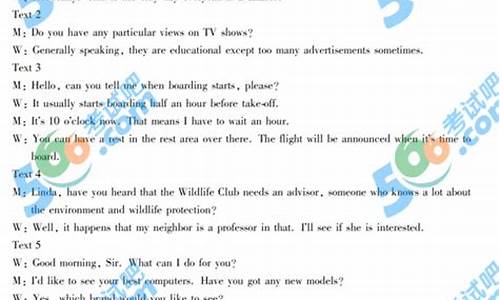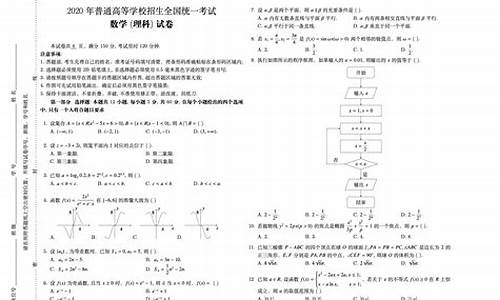您现在的位置是: 首页 > 教育政策 教育政策
2014全国高考卷英语_2014高考英语模拟试卷
tamoadmin 2024-07-05 人已围观
简介1.高考英语听力真题「全国I卷」2.2014江苏高考英语一条阅读,however wealthy we may be, we can never....... 有一题选3.2014年安徽高考英语c篇阅读理解翻译,多谢各位大神!11:30前最好能完成C 去年夏天,两个19世纪的农舍在蒙大拿州被远程农田所拯救,搬到了一个在旧金山的装饰艺术建筑中.建筑是由木头建成的.这些村社曾经搭建在原始的栖
1.高考英语听力真题「全国I卷」
2.2014江苏高考英语一条阅读,however wealthy we may be, we can never....... 有一题选
3.2014年安徽高考英语c篇阅读理解翻译,多谢各位大神!11:30前最好能完成

C
去年夏天,两个19世纪的农舍在蒙大拿州被远程农田所拯救,搬到了一个在旧金山的装饰艺术建筑中.建筑是由木头建成的.这些村社曾经搭建在原始的栖息地,为了他们可以在干燥的Montana土壤中生活.
这个村社可能会成为工业史上的带有“低科技水平”的一个奇怪案例,在互联网时代之前,这种概念与自然世界,老式工艺有着悠久的联系.“低科技”并不是虚拟的,所以为了可以好好利用它,因特网公司已经不得不开始创新.那个被拯救的木质村舍,在18世纪末用手做成,成为一个鲜明的例子。但是Twitter的设计存在于极端的尽头.其他的公司正在用一种宽泛的阐释针对于存在于自然界的“低科技”.
Amazon正在建造三个充满了大树的玻璃球,以至于雇员可以工作,社交在一个更自然,更公园式的环境.在Google的办公室,整个的地板都被铺上玻璃.Facebook上的第二名Menlo公园大学城将有一个带有步行小道的屋顶式公园.
Olle Lundberg,Lundberg设计的创始人,已经在许多科技公司工作了很多年.“我们在生活中已经丢失了与制造者的联系,我们的科技引擎已经开始贫乏,因为它们正在被数字世界围绕着”,他说,“他们正在寻求方法重新获得工厂的身份,我们发现介绍真正的工艺是解决的办法之一”.
这个工艺以理论为基础扎根于历史,William Morris,英国美术家和作家。在1860年代转向工业化以前的艺术,就在工业污染之后.工艺美术运动给他自己下了反对工业的定义.“没有有创造力的人类的工作,人类会变得与生活毫无联系”Morris 说.
调查已经显示了自然界可以恢复人们的精神能力,在日本病人被鼓励做“森林浴”.,在森林中漫步为了降低血压.这些健康的好处也应用于工作场所.Rachel Kaplvin,环境心理学的教授,已经花了很多年调查自然环境滋补的作用.他的调查发现那些在办公室与自然界有联系的工作者—甚至只是可以看到树木和花儿—都会感觉到很少的压力和更多的幸福.如果地科技的办公人可以尽量的滋养大脑,提高雇员的精神健康,那么很好,这就会使村社模式发展下去。
△希望对你有参考作用
△没有借用翻译器,良心翻译,希望加分
△希望采纳~
高考英语听力真题「全国I卷」
选项A. Some chimps lower their cry to keep food away from others.意思是:一些猩猩降低叫声的音量,目的是不让其他动物知道它发现了食物。keep...away from使...远离
选项B. The losing chimp won the fight by taking the winner's hand.意思是:打斗输了的猩猩通过抓住胜者的手来赢得胜利。
你所说的倒数第三段最后一句你理解错了After a fight, the losing chimp will give its hand to the other. When the winning chimp puts out its hand, too, the chimps are friendly again. But an animal expert once saw a losing chimp take the winner's hand and start fighting again.意思是:打斗后,输 了的猩猩会把手递给对方。获胜方也会伸出手,两个猩猩便重归于好了。可是动物专家曾经看到过打输了的猩猩拉起胜方的手后,再次开打。
明白了意思,你还认为B对吗?
2014江苏高考英语一条阅读,however wealthy we may be, we can never....... 有一题选
2014年高考英语听力真题「全国I卷」
高考听力语言材料一般来源于实际生活,围绕一个日常生活话题展开,涉及文化教育、人物、科普、时事等。为了帮助大家备考,我分享了一些英语听力试题,希望能对大家有所帮助!
第一部分 听力(共两节,满分30分)
做题时,先将答案标在试卷上。录音内容结束后,你将有两分钟的时间将试卷上的答案转涂到答题卡上。
第一节(共5小题;每小题1.5分,满分7.5分)
听下面5段对话。每段对话后有一个小题,从题中所给的.A、B、C三个选项中选出最佳选项,并标在试卷的相应位置。听完每段对话后,你都有10称钟的时间来回答有关小题如阅读下一小题。每段对话仅读一遍。
例:How much is the shirt?
A. £19.15. B. £9.18. C. £9.15.
答案是 C。
1. What does the woman want to do?
A. Find a place. B. Buy a map. C. Get an address.
2. What will the man do for the woman?
A. Repair her car.
B. Give her a ride..
C. Pick up her aunt.
3. Who might Mr. Peterson be?
A. A new professor.
B. A department head.
C. A company director.
4. What does the man think of the book?
A. Quite difficult..
B. Very interesting.
C. Too simple.
5. What are the speakers talking about?
A. Weather.
B. Clothes.
C. News.
第二节(共15小题;每小题1.5分,满分22.5分)
听下面5段对话或独白。每段对话或独白后有几个小题,从题中所给的A、B、C三个选项
中选出最佳选项,并标在试卷的相应位置。听每段对话或独白前,你将有时间阅读各个小题,每
小题5秒钟;听完后,各小题将给出5秒钟的作答时间。每段对话或独白读两遍。
听第6段材料,回答第6至7题。
6. Why is Harry unwilling to join the woman?
A. He has a pain in his knee.. B. He wants to watch TV. C. He is too lazy.
7. What will the woman probably do next?
A. Stay at home. B. Take Harry to hospital. C. Do some exercise.
听第7段材料,回答第8 、9题。
8. When will the man be home from work?
A. At 5:45. B. At 6:15. C. At 6:50.
9. Where will the speakers go ?'
A. The Green House Cinema. B. The New State Cinema . C. The UME Cinema.
听第 8段材料,回答第 10至 12题。
10. How will the speaker go to New York?
A. By air. B. By taxi. C. By bus.
11. Why are the speakers making the trip?
A. For business.
B. For shopping.
C. For holiday.
12. What is the probable relationship between the speakers?
A. Driver and passenger
B. Husband and wife.
C. Fellow workers.
听第 9段材料,回答第 13至 16题。
13. Where does this conversation probably take place?
A. In a restaurant. B. In an office. C. In a classroom.
14. What does John do now?
A. He?s a trainer. B. He?s a tour guide. C. He?s a college student.
15. How much can a new person earn for the first year?
A. $10,500. B. $ 12,000. C. $ 15,000.
16. How many people will the woman hire?
A. Four. B. Three. C. Two.
听第10段材料,回答第17至20题。
17. How long has the speaker lived in a big city?
A. One year.
B. Ten years.
C. Eighteen years.
18. What is the speaker?s opinion on public transport?
A. It?s comfortable. B. It?s time-saving. C. It?s cheap.
19. What is good about living in a small town?
A. It?s safer. B. It?s healthier. C. It?s more convenient.
20. What kind of life does the speaker seem to like most?
A. Busy. B. Colourful C. Quiet.
参考答案:
1-5 ABCBA 6-10 BCACA 11-15 ACBCA 16-20CBCAB
;2014年安徽高考英语c篇阅读理解翻译,多谢各位大神!11:30前最好能完成
However wealthy we may be, we can never find enough hours in the day to do everything we want. Economics deals with this problem through the concept of opportunity cost, which simply refers to whether someone’s time or money could be better spent on something else.
Every hour of our time has a value. For every hour we work at one job we could quite easily be doing another, or be sleeping or watching a film. Each of these options has a different opportunity cost—namely, what they cost us in missed opportunities.
Say you intend to watch a football match but the tickets are expensive and it will take you a couple of hours to get to and from the stadium. Why not, you might reason, watch the game from home and use the leftover money and time to have dinner with friends? This—the alternative use of your cash and time—is the opportunity cost.
For economists, every decision is made by knowledge of what one must forgo—in terms of money and enjoyment—in order to take it up. By knowing precisely what you are receiving and what you are missing out on, you ought to be able to make better-informed, more reasonable decisions. Consider that most famous economic rule of all: there’s no such thing as a free lunch. Even if someone offers to take you out to lunch for free, the time you will spend in the restaurant still costs you something in terms of forgone opportunities.
Some people find the idea of opportunity cost extremely discouraging: imagine spending your entire life calculating whether your time would be better spent elsewhere doing something more profitable or enjoyable. Yet, in a sense it’s human nature to do precisely that—we assess the advantages and disadvantages of decisions all the time.
In the business world, a popular phrase is “value for money.” People want their cash to go as far as possible. However, another is fast obtaining an advantage: “value for time.” The biggest restriction on our resources is the number of hours we can devote to something, so we look to maximize the return we get on our investment of time. By reading this passage you are giving over a bit of your time which could be spent doing other activities, such as sleeping and eating. In return, however, this passage will help you to think like an economist, closely considering the opportunity cost of each of your decisions.
小题2:The “leftover ... time” in Paragraph 3 probably refers to the time ________.
A.spared for watching the match at home
B.taken to have dinner with friends
C.spent on the way to and from the match
D.saved from not going to watch the match
试题分析:文章大意:本文是一篇议论文。文章论述了不管我们多么的富有,在一天里我们不可能找到足够的时间做我们想要做的一切。因此,我们要放弃一些事情选择做更好的事情。
小题2:C考查词义推测。题中“leftover money and time”是指“剩下来的钱和时间”。根据文章第三段第一句Say you intend to watch a football match but the tickets are expensive and it will take you a couple of hours to get to and from the stadium.可知leftover … time所指的是“花在观看比赛(路上)来去的时间”。故C正确。
文章介绍一些新博物馆,收藏的是普通人的收藏品,他们这么做的目的是想通过展示普通人收集的东西来促进博物馆文化的,研究收藏的重要性。
小题1:细节题:根据文章第二段的第二、三行的句子:the first of several new museums which, over the next two years, will exhibit the objects accumulated by unknown collectors. In doing so, they will promote a popular culture of museums, not what museums normally represent.可知新的博物馆是通过展示普通人收集的东西来促进博物馆文化的,所以选B。
小题2:细节题:根据文章第三段的最后一个句子:But they all reveal (显露)a lot of things: ask someone what they collect and their answers will tell you who they are.可知从人们的收藏中可以看出他们是什么样的人,选A
小题3:细节题:根据文章第四段第四行的句子:The thinkers behind the project want to explore why people collect, and what it means to do so. They hope that visitors who may not have considered themselves collectors will begin to see they, too, collect.可知新的博物馆是想探索人们为什么收藏,收藏的意义是什么,所以它们的目的是研究收藏的重要性,所以选C
小题4:细节题:根据文章最后一段第二行的句子:“it’s a growing-up thing; you stop when you grow up,”says one.可知人们在成年后会停止收集东西,所以选A。









